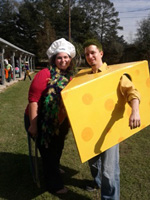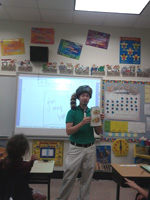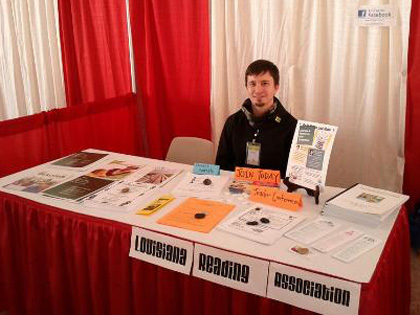The March IRA Member of the Month is Cory Lemoine from Louisiana. The Baton Rouge Center for Visual & Performing Arts (BRCVPA) third-grade teacher was given the Master Teacher Award in 2011. He tells Reading Today his thoughts on teaching literacy, technology in the classroom, and how IRA councils got him out of his "bubble!"
What made you want to become a teacher?
After exploring a variety of ideas, I decided that teaching was the best use of my various talents. My interests lie in many content areas, so I knew I would be knowledgeable and hoped to inform my students on how to become successful citizens in our world.
As a literacy educator, how do you motivate kids to want to read?
 To motivate kids to read, I generally make reading aloud part of everyday instruction. I try to make it fun in many ways, be it through questioning techniques, relating the content to their life experiences, or making sure to find reading that is not only at their independent reading level, but is also within their interests as well. For boys especially, I work to try to stock my classroom library with lots of nonfiction books and magazines at varied levels to help motivate them to read.
To motivate kids to read, I generally make reading aloud part of everyday instruction. I try to make it fun in many ways, be it through questioning techniques, relating the content to their life experiences, or making sure to find reading that is not only at their independent reading level, but is also within their interests as well. For boys especially, I work to try to stock my classroom library with lots of nonfiction books and magazines at varied levels to help motivate them to read.
What books or genres do you recommend to parents/families looking help their kids become better readers?
This question depends on what level reader a child is. For those below their grade level, I recommend parents find books that are easy readers to help motivate a child to become fluent in lower reads so that the joy of reading can gradually grow as the child grows as a reader. Any series or genres are great for this, especially if they are what the child/children are interested in. I do find that fiction tends to lend itself more to helping students work at reading more fluently because children typically are familiar with how stories work. For those who are on grade level, I suggest fiction books such as the Magic Tree House series, Diary of a Wimpy Kid series, or the Big Nate series. These have proven successful, especially the latter two, in motivating and helping average readers to be successful at a higher level. I also suggest any nonfiction books in which students have an interest. As an elementary teacher, I enjoy pushing my top readers to reach as far as I can. I have been known to work with this small group on middle school books to continue to push them upward. These are generally fictional, many of which are more in the realm of fantasy (these tend to entice their imaginations).
You were given the Master Teacher Award and your school received the ACHIEVE3000 Power of Technology Reading and Writing Award. Plus, you have a great classroom website. How do you see technology playing a role in education for elementary school children, both now and in the future?
 Since I began teaching 10 years ago, technology in my classroom has changed greatly. With the amount of technology in the classroom, generating data and being an efficient instructor are two huge outcomes of the continued wave of technology. At present, using an interactive whiteboard on a daily basis in my classroom has allowed me to be able to more efficiently make connections to concepts from the past than ever before. Technology also helps me to reach students through different modalities to ensure a greater student success rate. No longer do I have to go and find an encyclopedia to show a picture to a student of a volcano. The internet is right at our fingertips so that not only can we see pictures of volcanoes, but we can also see a video of one erupting, someone’s personal experiences with one, and even a satellite imagery of one from different angles. Technology also allows the current generation to learn in a manner that is more consistent with the world that they are growing up in. In the future, I think a time will come when we no longer have textbooks in the classroom taking up so much space. Instead each student will have some sort of electronic reader or tablet computer where all textbook information, worksheets, notes, etc. will be stored on. A new wave of electronic tables/desks is beginning to rise, and the adoption of these and various other technologies that are around make many teachers feel that we are truly in a science fiction movie that we never thought would come true in our lifetimes.
Since I began teaching 10 years ago, technology in my classroom has changed greatly. With the amount of technology in the classroom, generating data and being an efficient instructor are two huge outcomes of the continued wave of technology. At present, using an interactive whiteboard on a daily basis in my classroom has allowed me to be able to more efficiently make connections to concepts from the past than ever before. Technology also helps me to reach students through different modalities to ensure a greater student success rate. No longer do I have to go and find an encyclopedia to show a picture to a student of a volcano. The internet is right at our fingertips so that not only can we see pictures of volcanoes, but we can also see a video of one erupting, someone’s personal experiences with one, and even a satellite imagery of one from different angles. Technology also allows the current generation to learn in a manner that is more consistent with the world that they are growing up in. In the future, I think a time will come when we no longer have textbooks in the classroom taking up so much space. Instead each student will have some sort of electronic reader or tablet computer where all textbook information, worksheets, notes, etc. will be stored on. A new wave of electronic tables/desks is beginning to rise, and the adoption of these and various other technologies that are around make many teachers feel that we are truly in a science fiction movie that we never thought would come true in our lifetimes.
How did you become involved in the International Reading Association (IRA) and the Louisiana Reading Association (LRA)? What do you value most about your membership?
 When I was in my fifth year of teaching, I was contacted by a supervisor in my school district that asked if I would consider being vice-president of my local reading council. The idea was that I would learn for two years becoming president of the council after that. Well, things don’t always work out the way they are expected to. The next year I became the president of a council that had decreased in membership and activity for several years, so I was tasked with working to build back up to a historically prosperous council. It is through the work that I did with my local organization that I became familiar with the state and international organizations. My five years in the organizations have been a treat! I have become part of a community of teachers and learners from not only around my state, but also my world. No more getting stuck in the little bubble that I lived in! I have made relationships with so many wonderful people that I never would have if it weren’t for the reading councils. I value the dedication, service, and learning from members of these great councils that have helped me to become a better organization member as well as teacher.
When I was in my fifth year of teaching, I was contacted by a supervisor in my school district that asked if I would consider being vice-president of my local reading council. The idea was that I would learn for two years becoming president of the council after that. Well, things don’t always work out the way they are expected to. The next year I became the president of a council that had decreased in membership and activity for several years, so I was tasked with working to build back up to a historically prosperous council. It is through the work that I did with my local organization that I became familiar with the state and international organizations. My five years in the organizations have been a treat! I have become part of a community of teachers and learners from not only around my state, but also my world. No more getting stuck in the little bubble that I lived in! I have made relationships with so many wonderful people that I never would have if it weren’t for the reading councils. I value the dedication, service, and learning from members of these great councils that have helped me to become a better organization member as well as teacher.
What do you consider to be your proudest career moment?
 This is too difficult to pinpoint. Every time one of my current or former students receives any kind of award or recognition at my school, or any time my students work in a production of some sort and I see their joy, dedication, and success, I get teary eyed and feel very proud. No matter what awards, accomplishments, or successes I achieve, my proudest moments will always be seeing all of my students excel in some way. I love all of my students and they make every day the proudest moments in my career.
This is too difficult to pinpoint. Every time one of my current or former students receives any kind of award or recognition at my school, or any time my students work in a production of some sort and I see their joy, dedication, and success, I get teary eyed and feel very proud. No matter what awards, accomplishments, or successes I achieve, my proudest moments will always be seeing all of my students excel in some way. I love all of my students and they make every day the proudest moments in my career.
What’s the best advice you could offer someone new to the profession?
For those new in the field, I suggest staying informed and connected to other professionals beyond their school assignment. Also, keep your chin up and your attitude positive! Times will get tough and stressful! Remember that you are in your first year and that you are doing the best you can. No one is super teacher, not even after ten years. We are all constantly learning. If you are having trouble, don’t be afraid to ask. There are a multitude of websites and blogs out there dedicated to making teaching more fun and creative at the same time as meeting the rigorous standards that our students face. No need to reinvent the wheel when someone out there is willing to share their knowledge and activities. I also suggest making sure to have a life outside of teaching. This will help life to stay balanced keeping teaching from becoming all-consuming. I LOVE teaching, but I also cherish the time I get to spend with family and friends.
What do you like to do when you’re not wearing your educator hat?
I enjoy two things the most when I’m not in teacher mode. Firstly, I enjoy spending time with my family, especially my two nieces and two nephews. Seeing their happy loving smiles and playful attitudes toward life help me to stay young. Secondly, (but really tied for first) I exceedingly enjoy gardening. I love being outdoors, and nothing brings me more at peace than working in dirt to create something beautiful. Be it vegetable or flower gardening, or even raising five chickens, being outdoors centers me and completes the balancing in my life that I need.